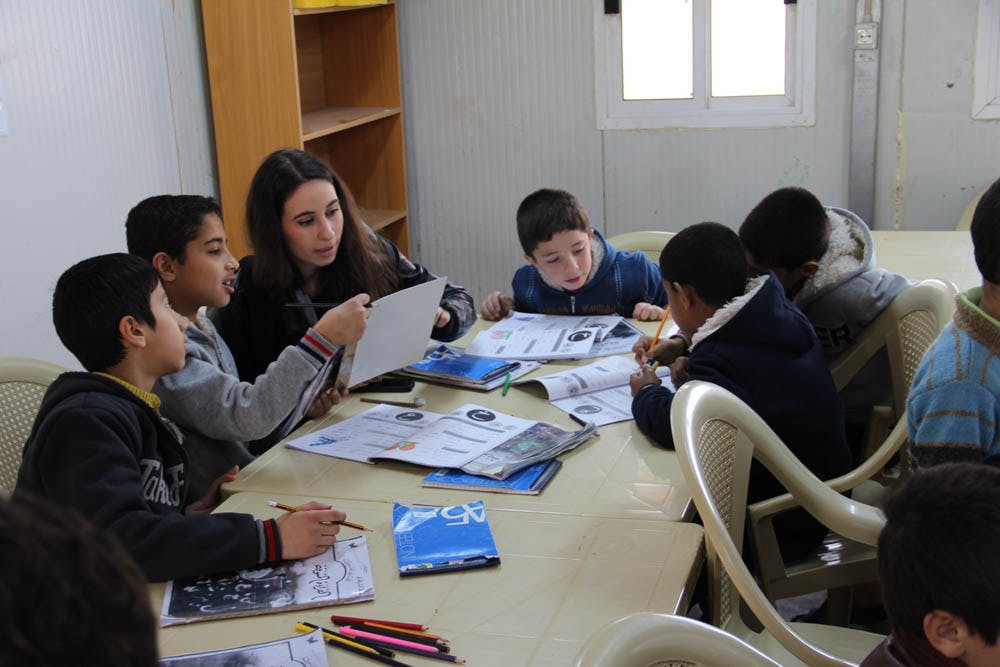Scientists, humanitarian aid experts and scholars gathered to discuss stress and resilience in Syrian refugee children at this weekend’s fourth annual Engaged Scholarship Conference. The conference is hosted every year by Middle East Studies and was co-sponsored this year by the Brown Institute for Brain Science and the Department of Cognitive, Linguistic and Psychological Sciences.
The conference centered around understanding the long-term effects of the stress Syrian refugee children face because of displacement during critical periods of brain development and how to mitigate these effects by teaching children strategies of resilience. These skills, if adopted by children during this sensitive period of neurological development, could potentially mitigate some of the negative effects of stress.
The conference follows a trip taken by a team of four professors and one undergraduate to refugee camps in January 2016. The team began studying the issue intensely and conducting interviews with nongovernmental organization experts in fall 2015.
In Jordan, they visited the Za‘atari and Cyber City refugee camps. The former houses approximately 70,000 Syrian refugees and the latter around 400 Palestinian refugees who were formerly living in Syria, said Sarah Tobin, associate director of MES. She has conducted research in the camps for the past several years.
The January trip was not about conducting research or implementing a project, said Dima Amso, associate professor of CLPS. “What we’re doing is linking the existing scientific research on brain development with the currently existing humanitarian aid on the ground and trying to see if the science can offer a service to the NGOs and UNICEF,” she added.
The scientists on the trip felt that “this issue should be placed in a particular context, which is regional, cultural and socioeconomic,” said Carl Saab, associate professor at Brown and Rhode Island Hospital, in the departments of neuroscience and neurosurgery.
The MES researchers added “the importance of cultural context to the discussion,” Tobin said. “We’re hoping to really localize the discussion.”
Researchers from MES were able to add a scholarly perspective, critical to understanding the scope and context of the stressors that affect children and their families, Amso said.
The group went to Jordan without preconceptions. “We were completely passive, open to ideas and completely observing. … No matter how much you read, what you see on the ground is just transformative,” Saab said.
Tala Doumani ’17, who was the trip’s lone undergraduate, noted the importance of experiencing the “human dimension” of the refugee crisis.
“One does not get a full idea of what life is like on a daily level until they go there,” said Beshara Doumani P’17, professor of history and modern Middle East studies and director of MES. He added that his team is “very aware that there are a lot of problems in just parachuting in and out and saying ‘We’re going to help the other.’ But we have no intention of doing that at all.”
Doumani said that while the trip served as a “fact-finding mission,” the conference could serve as a platform for identifying ways in which different organizations might collaborate to help Syrian refugee children develop strategies of resilience.
Tobin said that the solutions to society’s most pressing problems often requires an interdisciplinary approach, bringing together people from disparate fields.
The conference panelists spoke on a wide variety of topics, including the role of adversity in childhood, which President Christina Paxson P’19 focused on in her presentation. Paxson discussed methods of resilience and a study she contributed to on the recovery of people affected by Hurricane Katrina. Other notable talks included one by Frank Roni, a child protection specialist for camps at UNICEF Jordan, who spoke about the response of UNICEF Jordan to the refugee crisis as it pertains to displaced children. Additionally, Megan Gunnar, director of the Institute of Child Development at the University of Minnesota, discussed the role that relationships can play in aiding stress regulation.
The talks on Saturday included an overview of Save the Children’s response in the region by Marcia Brophy of Save the Children International. Assistant Professor of CLPS Kevin Bath illustrated how best to translate his work on early life stress and brain development to practical recommendations on the ground.
Many of the conference’s participants emphasized the role that students and community members can play in helping displaced Syrians.
The Syrian refugee crisis is no longer a problem that exists solely in the Middle East or Europe, Tobin said, but one that has begun to affect Rhode Island and the greater United States.
“Students need to be involved, and the best way they can be involved is to find refugees in Rhode Island, in Providence, and work to make them feel at home,” she added.





